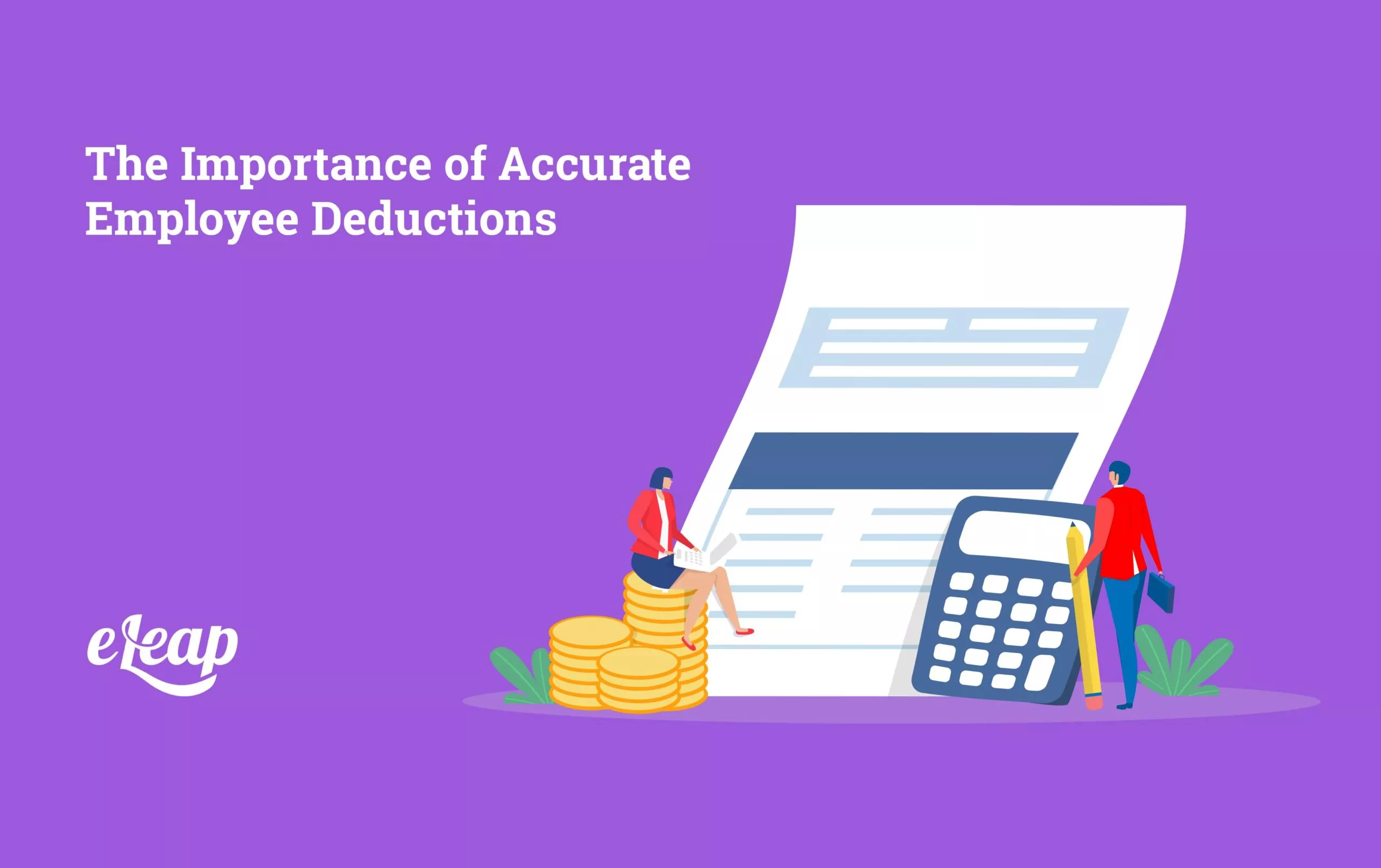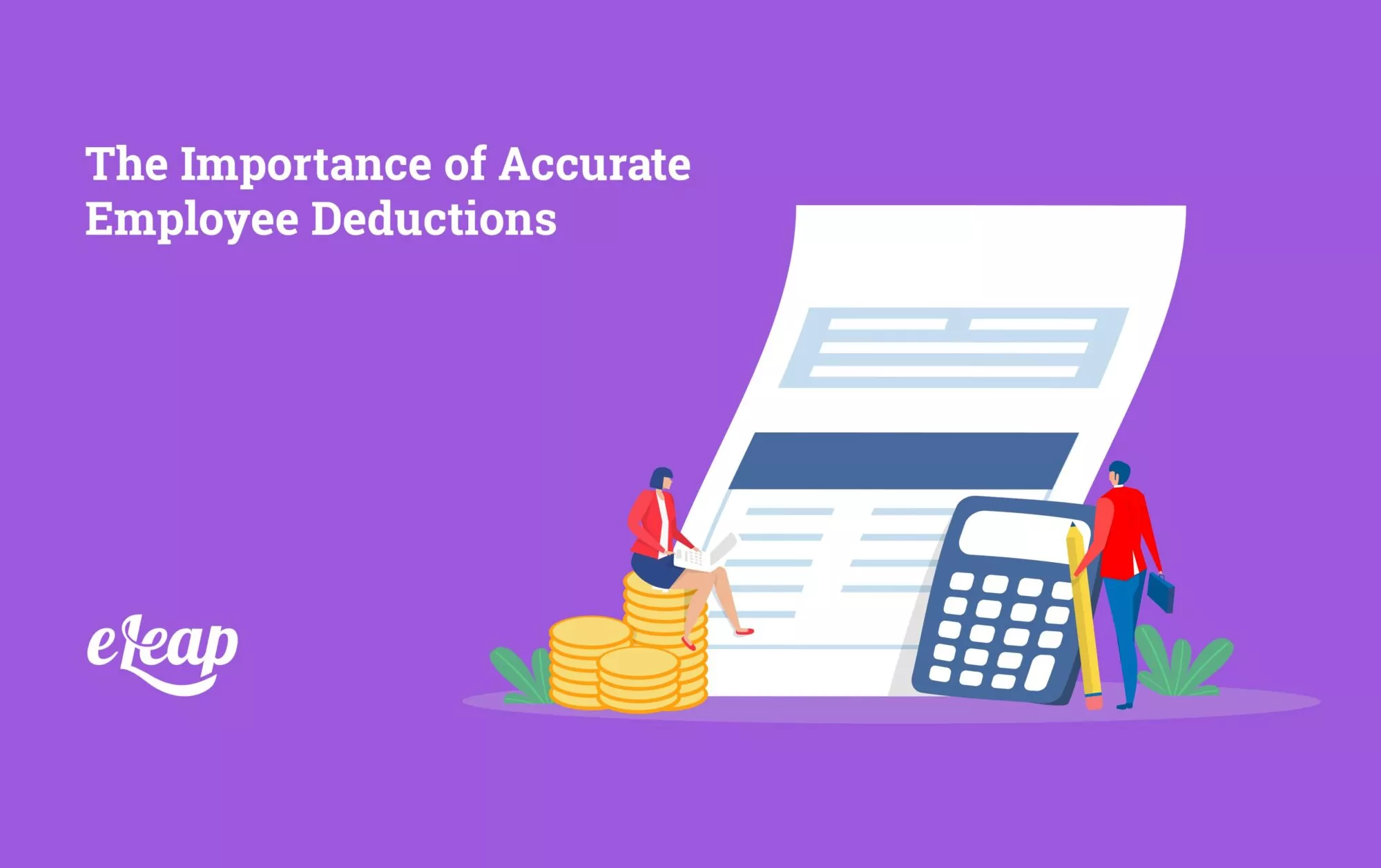The Importance of Accurate Employee Deductions

Employee deductions are an essential aspect of payroll management that businesses must handle precisely to ensure legal compliance, employee trust, and operational efficiency. These deductions are required when employers withhold portions of an employee’s earnings for various purposes, such as taxes, retirement savings, and insurance premiums. Ensuring that these deductions are accurate is essential for regulatory reasons, maintaining employee satisfaction, and avoiding costly penalties. See how eLeaP’s Performance Management Platform helps you apply these insights to drive better results.

This article will explore the importance of accurate employee deductions, focusing on the different types, common mistakes, best practices, and the consequences of errors. We will also discuss how businesses can optimize payroll processes to ensure compliance and maintain employee trust.
Understanding Different Types of Employee Deductions
Employee deductions can be categorized into two main groups: mandatory and voluntary. Both types play a critical role in ensuring employees meet their legal obligations while benefiting from employer-sponsored programs.
Mandatory Deductions
Mandatory deductions are those that employers are legally required to withhold from employees’ paychecks. They ensure compliance with federal, state, and local laws. Mandatory deductions are non-negotiable and must be made according to the legal requirements.
Income Tax Withholdings
Income tax withholding is the most significant mandatory deduction. The federal government and state and local governments require employers to withhold income taxes from employees’ wages. These withholdings are based on several factors, including the employee’s income, marital status, and the number of allowances claimed on their W-4 form. The tax rates are progressive, increasing as an employee’s earnings rise.
Failure to withhold the correct amount of income tax can result in fines for the employer and financial penalties for the employee when they file their taxes. Businesses must stay updated on tax law changes to avoid such errors. Additionally, an accurate withholding ensures that employees don’t get a surprise tax bill at the end of the year.
Social Security and Medicare Contributions
Social Security and Medicare taxes are part of the Federal Insurance Contributions Act (FICA). These taxes are deducted from employees’ paychecks to fund federal programs that provide retirement benefits and healthcare to eligible individuals. Social Security tax is typically 6.2% of an employee’s earnings, while Medicare tax is 1.45%.
Employers match these contributions, meaning that for every dollar an employee contributes to Social Security and Medicare, the employer must also contribute the same amount. These deductions must be made accurately to ensure employees receive the correct benefits when they reach retirement age or need healthcare services.
Unemployment Insurance
Unemployment insurance is a mandatory deduction in many states. It helps financially assist workers who lose their jobs through no fault. Both federal and state governments levy unemployment taxes, but the rates can vary by state. Employers are responsible for deducting unemployment insurance taxes from their employee’s wages and remitting them to the appropriate government agencies.
Voluntary Deductions
Voluntary deductions are amounts that employees elect to have withheld from their paychecks. Unlike mandatory deductions, employees can choose whether or not to participate in these programs. Voluntary deductions can be significant for employees and employers, as they help fund employee benefits and retirement plans.
Retirement Contributions (e.g., 401(k), Pensions)
Retirement contributions, such as those to a 401(k) or pension plan, are standard voluntary deductions. Employees can choose to set aside a portion of their earnings for retirement, often with matching contributions from the employer. These contributions are deducted from the employee’s pay before taxes, reducing their taxable income and providing long-term financial security.
Employers benefit from offering retirement plans by attracting and retaining employees, particularly those who value long-term financial planning. However, businesses must ensure that the correct amount is deducted and deposited into the appropriate retirement account to maintain trust and compliance.
Health, Life, and Disability Insurance
Many employers provide health, life, and disability insurance to their employees. These benefits are often offered as part of a comprehensive benefits package. Employees can elect to have premiums for these insurance policies deducted directly from their paychecks. Health insurance deductions, for example, may vary depending on the plan chosen by the employee.
Ensuring the accuracy of these deductions is vital because incorrect amounts can result in employees losing coverage or having to pay more than expected for their premiums. Additionally, businesses must ensure that any changes to the employee’s benefits during open enrollment periods are reflected in the deductions.
Other Voluntary Benefits
Other voluntary deductions include commuter benefits, student loan repayment programs, and charitable contributions. Though not mandatory, these deductions provide employees additional perks and can improve their overall financial well-being. For businesses, offering such benefits helps increase employee satisfaction and loyalty.
Employers should inform employees about available benefits and ensure that deductions related to these benefits are processed correctly.
The Critical Importance of Accurate Deductions
Legal Compliance: Avoiding IRS Penalties
Accurate employee deductions are crucial for complying with federal, state, and local tax laws. The Internal Revenue Service (IRS) and state tax authorities have strict requirements for how deductions should be calculated and remitted. Failure to comply with these regulations can result in significant penalties, fines, and legal action.
For instance, miscalculating income tax withholdings can result in underpayment, which may lead to hefty fines. Similarly, errors in Social Security and Medicare contributions can lead to penalties for both employers and employees. To avoid such consequences, businesses must stay updated on tax rates and ensure accurate systems are in place for withholding and remitting deductions.
Employee Trust and Retention
Employees depend on accurate deductions to ensure their financial security. When deductions are incorrect, it can cause confusion and dissatisfaction. Employees may be left with insufficient funds for their benefits, retirement plans, or taxes, leading to frustration and a loss of trust in the employer.
Maintaining accurate deductions helps build employee trust and fosters a positive relationship between the employer and employee. When employees feel confident that their deductions are correctly handled, they are likelier to stay engaged with the company.
Common Mistakes in Employee Deductions and How to Avoid Them
Tax Withholding Errors
One of the most common mistakes in employee deductions is miscalculating tax withholdings. Tax laws are complex and change frequently, so it’s easy for businesses to make errors. For example, incorrect information on an employee’s W-4 form can result in too much or too little tax being withheld. Companies must use the most up-to-date tax tables and correctly preprocess relevant forms.
Businesses should invest in reliable payroll software and regularly audit their payroll processes to avoid errors. Additionally, it’s essential to educate HR staff and payroll teams on the latest tax laws and withholdings.
Benefit Deductions Mistakes
Another common mistake is mishandling benefit deductions, such as those for health insurance or retirement plans. Incorrect deductions can lead to employees not receiving the benefits they have paid for or being overcharged for their benefits. These errors can lead to legal disputes and damage the company’s reputation.
Businesses should integrate their payroll system with their benefits management platform to prevent benefit deduction mistakes. Reviewing and confirming employee elections regularly during open enrollment periods is also essential.
Best Practices for Ensuring Accurate Employee Deductions
Implementing Payroll Software Solutions
Using advanced payroll software is one of the most effective ways to ensure the accuracy of employee deductions. Payroll software automates many deduction processes, reducing the risk of human error. Systems like eLeaP streamline the process by integrating tax tables, benefit deductions, and retirement contributions. This process reduces administrative work and ensures that deductions are accurate and compliant with current laws.
Conducting Regular Payroll Audits
Regular payroll audits are essential for identifying any discrepancies in employee deductions. Audits should be conducted periodically to check for errors and ensure all deductions are handled correctly. Having a dedicated payroll team or working with a payroll service provider can make this process more efficient and help catch any mistakes before they become serious issues.
Training HR and Payroll Teams on Deduction Policies
Employees responsible for payroll must be well-versed in deduction policies and any changes to tax laws. Regular training sessions and workshops can help keep HR and payroll teams updated on the latest regulations. Additionally, creating clear guidelines and checklists for payroll processes can help reduce errors and ensure everyone is on the same page.
The Future of Employee Deductions
With technological advances, the landscape of employee deductions is evolving. Automation and artificial intelligence are expected to significantly streamline payroll processes, reduce the risk of human error, and improve compliance. Tools like eLeaP can help businesses avoid these changes by offering automated solutions that reduce administrative burdens and ensure accuracy.
New trends in employee benefits, such as student loan repayment programs and flexible benefits packages, are also shaping the future of payroll deductions. Employers must adapt to these changes to remain competitive and continue offering attractive benefits to their employees.
Conclusion
Accurate employee deductions are vital for both businesses and their employees. They ensure legal compliance, build employee trust, and help avoid costly errors and penalties. Companies can ensure their payroll processes are efficient and accurate by implementing best practices such as using reliable payroll software, conducting regular audits, and training HR staff.
Employers should view accurate deductions as a legal requirement and an opportunity to demonstrate their commitment to employee satisfaction and long-term success. With the right systems and knowledge, businesses can ensure smooth payroll operations and avoid the risks associated with inaccurate deductions.